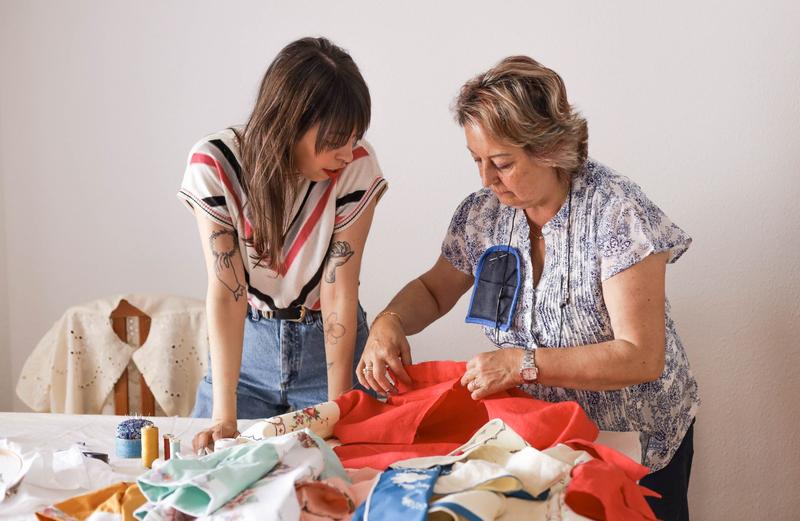The sustainable firm Neko launches a collection of 'upcycled' shirts that looks at the roots of our mothers and grandmothers
sustainabilityWe spoke with Mireya Romero, founder and creative of Neko, to tell us the story, full of emotion and memory, of this collection called Raíces
By Alba Correa
At the age of fourteen, Josefa Alquezar already knew how to sew and embroider. Being the eldest of five siblings in a family from the town of Teruel in Andorra, her daily tasks and skills covered the entire spectrum of domestic and reproductive work, from caring for the little ones in the house to cooking, including, of course, housework. sewing. Among the objects she cut, sewed and embroidered were tablecloths, handkerchiefs and sheets, intimate fabrics that contain the history of the houses and do not tell anyone. Josefa tried embroidered daisies on quilts, learned to draw a fish with the jack and a of the initials of her name, and with it she signed a kitchen towel with artist's mastery. Today all this textile memory, together with that of other women with stories that intersect with Josefa's, has been collected by her daughter, Mireya Romero Alquezar, owner and soul of Neko, a firm in Barcelona that works with vintage fashion and small collections. of handmade garments with a fervent group of clients inside and outside of Barcelona.
Two years ago, Mireya began visiting antique markets, and plowing through the offer of second-hand apps, in search of vintage treasures among bedding and table linen. In her hand she has had real jewels, precious linen, flowers embroidered with the same care that her mother used, relics that speak of the life of the hands that threaded the needle in the heart of the home, sometimes the only space in which she was his presence conceived. At first she did it just because they were beautiful pieces, full of value for her, but soon an idea began to take shape in her head: to give these fabrics a second life.
This is how Raíz was born, a capsule collection of upcycled shirts made with table linen, bedding and other vintage fabrics finished by hand, some even from his family home. Garments that have been designed and made by Mireya and Josefa themselves at their home in Vinaròs (Castellón), designed and assembled calmly to favor the natural beauty of the fabric, and that will be on sale tomorrow, June 17, at the online store of Neko.
We spoke with Mireya herself so she could tell us everything behind this emotional collection, unique in the world.
How was Raíz born?

Mireya Romero (founder and designer of Neko): My mother is the eldest of five siblings and my mother's entire family sewed at home (my grandmother, great-grandmother, great-aunts...) At the age of 12 they put her to sew and embroider to learn The girls then learned to embroider because they wanted them to learn qualities of neatness, of knowing how to be calm. In my house, when we were little, my mother made clothes for us, she made my sister's wedding dress, she made her trousseau and her sister's as well. Also, since we had a garden and animals, my grandmother could suddenly make a skirt out of some of my grandfather's old pants. It is something that I have always seen: in my house things were not thrown away. This is the story of all of us who have roots in rural areas, our grandparents lived through a difficult post-war period and are used to reusing everything, and giving value to everything, which is also beautiful. For example, before, hand-embroidered tablecloths were valued, but now I have bought some for sixteen euros.
@socialite_miss @_ParadiseParis The black femininity crew.
— Tikz Sun Jun 13 19:03:32 +0000 2021
What is your goal with this collection?
Mireya Romero: My intention is to pay homage to objects that were originally part of the feminine universe. Bedspreads, tablecloths, napkins. Give them a spin, take them out of the drawers and take them to the street, which is where they often couldn't be. Much of the public space (bars, etc.) was reserved for men. The idea of reusing fabrics is not something that I have invented, but I think it is important to transmit this practice again so as not to consume so much, not pollute so much...
How did you and your mother make it?
Mireya Romero: We created the pattern between the two of us. We made a puzzle fitting the pieces in it to see how it would be better. The raw and blue shirt, for example, I have lost count of the pieces it has. The materials are very delicate and for me they have a very beautiful value, and for that reason I did not want to waste anything. I wanted, more than overloading the shirts, that each flower, each special element, had a leading role. The good thing about reusing is not to overwhelm and put everything on, but to think about it, meditate on it. I was from Sunday to Thursday in Vinaròs. More than ten hours thinking about what to do with each shirt, and we are fast!
Thinking about the time that you have been collecting the material, that some of it comes from your family, about the time that you and your mother have dedicated to it, how do you calculate the value of the garments in this collection?
Mireya Romero: The value is incalculable. Putting an economic value on each item of my collections is what is most difficult for me, and this is the one that is going to cost me the most. It's the last thing I always do, I'm calculating it with Arnau, my partner, who is a graphic designer, -also self-employed-, and he helps me. He tells me not to put things so cheap, he asks me the hours I have worked, etc. But I don't listen to it half the time because otherwise it would cost a lot more. What I try to be is a little more realistic. I make very small collections because it never pays off. But I do it because I like it.
What stops you from setting the price that you know it should have?
Mireya Romero: I believe in myself and in my work despite the impostor syndrome that I have in this trade, something that did not happen to me when I was a social educator. I don't know why, I'm not a person who has had many doubts about anything, but in Neko I am insecure. It will be because I have not had the training that other people have. We are in a country where artistic work is very complicated, and manual work is undervalued, because you can buy fast fashion for ten euros. I try to put a price with which I feel more or less comfortable, which is something that I am doing better now, because at first it was fatal. My first tailored pants cost 59 euros. But I also try to be accessible to people. It's not because I think it's bad to earn money, but I don't want to be a billionaire, what I want is to enjoy my work, that it reaches people and that it allows me to live from this. It is true that some things could be a little more expensive but I'm fine as I am. I want the shirts to be owned by people who value them and wear them.
Are you excited to think that these pieces have a second life in these garments?
Mireya Romero: Yes, it's a tribute. Although I don't know them personally, I would like to think that after all the hours that these ladies have been sewing, locked up in their house, they will find someone who will admire their work and who will not keep it in drawers.
You've always been very open with what you think about the way vintage fashion is bought. Obviously buying vintage is more sustainable than buying new, but you also call for calm on your social networks, not to buy vintage on impulse
Mireya Romero: You don't have to buy from impulsiveness, but if You are really going to wear it, if you are going to give it a value. For me vintage clothing has value. It is something so beautiful that it cannot stay in the closet. So I always try to convey that value. Selling is not bad in itself, but it can be bad when someone does not have a need and you are trying to sell them something, and you are telling them "buy it or they will take it away from you". Having a closet full of vintage clothes that you don't wear is not sustainable. In the atelier I tell people when I see that they doubt something. I tell them not to buy it, even if they like it. It's important to talk about this. We are people who spend all day working, we are tired and buying clothes gives you the mini rush and you feel good. But then you say, ugh, my closet is full of things that I don't wear, full of nothing, even if you have a lot. That's because you buy things you don't value. I couldn't do Neko any other way than this, the most honest for me.\
Precious tableware made in Spain that combines design and craftsmanship
10 PhotosBy Eva Blanco Medina
See photosSUBSCRIBE to our newsletter to receive all the news in fashion, beauty and lifestyle.









